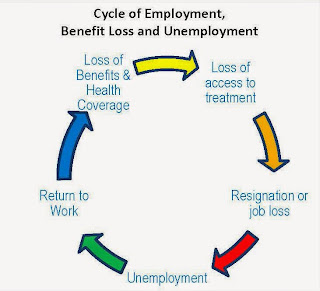July 14, 2014
“My mental condition was horribly debilitating for many years. I had no reason to get out of bed in the morning….I had no direction and no purpose. Now, when my feet hit the floor, I get to go to work every day and practice my passion.” – Stephanie Joseph, CPA, Office Administrator NAMI, Montgomery County.
 Ask 100 different people what work means to them, and you are likely to get 100 different responses. It can simply mean a source of income; it can provide a purpose; it can create order in life; it can be an opportunity for creativity and building something new; it can be a chance to help others.
Ask 100 different people what work means to them, and you are likely to get 100 different responses. It can simply mean a source of income; it can provide a purpose; it can create order in life; it can be an opportunity for creativity and building something new; it can be a chance to help others.
People with mental illness work successfully in a range of professions: at artists, scientists, famers, engineers, lawyers, construction, workers, chefs. Look anywhere and you will find people with mental illness leading and innovating.
Yet, the reality in America is that many people with mental illness are either unemployed or underemployed. Bouts of illness, difficulty concentrating, trouble communicating with co-workers, medical appointments and absences from work can make getting and keeping a job difficult. Stigma and discrimination can also be great barriers to overcome.
NAMI just released a report, Road to Recovery: Employment and Mental Illness, which explores the current state of mental illness and employment in the United States. It examines the reasons for low unemployment rates among people with mental health conditions, and describes the most effective supported employment programs that have been developed to date. The report is also a call to action for policymakers and advocates. It includes policy recommendations and model legislation that leaders could use to make supported employment programs available to the people who need them.
Almost 80 percent of the nearly 7 million individuals served by the public mental health system in this country are unemployed. About 60 to 70 percent of these same people want to work and would work if they had appropriate support. The current employment support systems we have in place are simply not effective for most people with mental health conditions. It is time for a change.
The good news is that there are employment programs that have been studied, tested, and shown to help people with mental illness choose, get and keep a job.
Individual Placement and Support (IPS) Supported Employment is a system that focuses on rapid placement in competitive employment and in jobs that match an individual’s talents and interests. IPS has a strong evidence-base shown to significantly improve the opportunities for people with mental illness to find and keep employment.
Clubhouses are community centers open to anyone with a mental illness. Clubhouses offer a variety of employment services including transitional employment and independent employment programs. Both have been proven through research to help improve opportunities to find and keep employment.
Assertive Community Treatment (ACT) is a team-based system that provides intensive support services to people with serious mental illness in the community whenever and wherever they are needed 24/7. Every ACT team should include a vocational specialist. ACT has a proven track record of helping people find and keep employment.
When we invest in programs that work, we invest in real lives, in real people, in real success and real recovery.
Submit To The NAMI Blog
We’re always accepting submissions to the NAMI Blog! We feature the latest research, stories of recovery, ways to end stigma and strategies for living well with mental illness. Most importantly: We feature your voices.
LEARN MORE